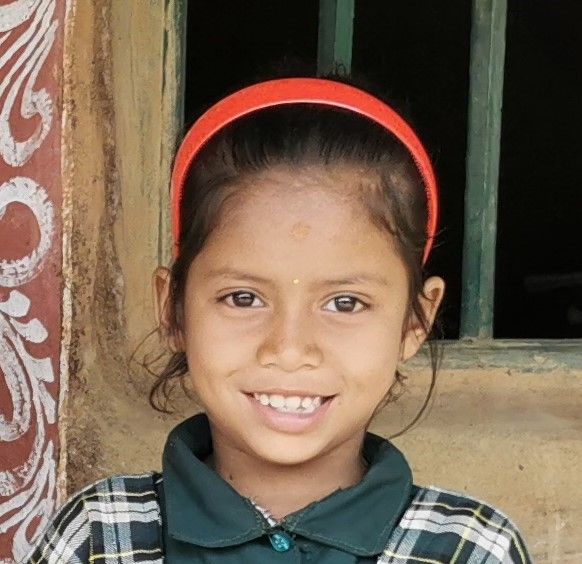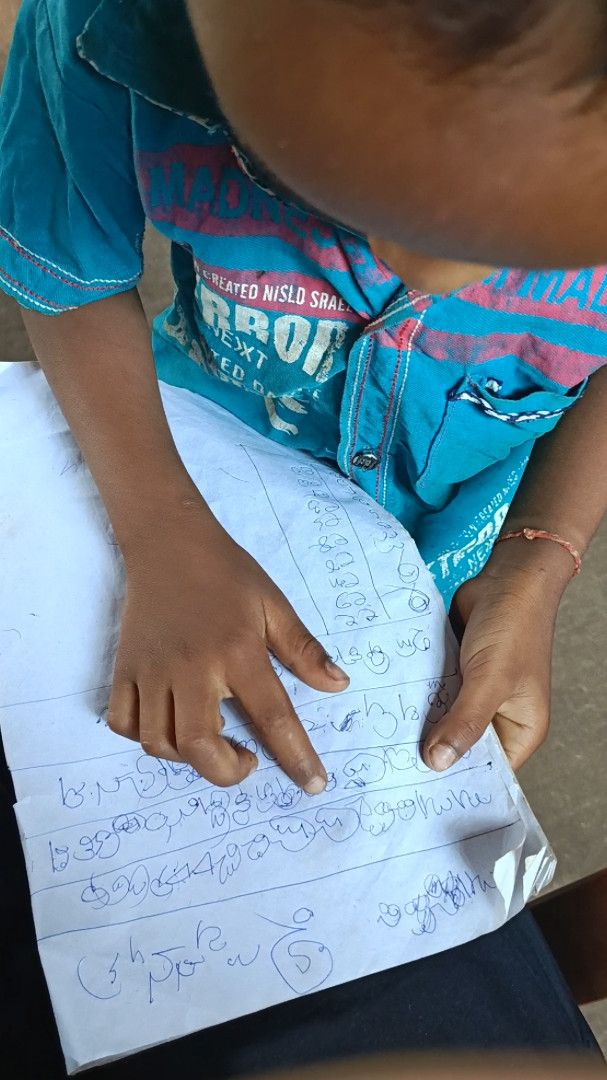Project visit April 2024
Srinath Pradhan, secretary of Anwesana, the organisation that implements ChildRightNow's projects in the needy communities of eastern India, describes the Moving School in Mankadapada as the most successful project to date. It is not the most successful because there are so many children attending school in this project or because the children achieve particularly high academic results, but because a huge change has been achieved in such a short time, in just two years.
The first thing that struck me when I visited this village was that it is not accessible by car. All other places are easily accessible by car. But here you first have to ride a motorbike through rough terrain and then walk the last kilometre. Over a stony, slightly ascending path. Anwesana employee Gajendra Vamsidhar told me how difficult it was to organise transport for the construction of the water tower.
The main difficulty was convincing the workers that they should do it. The sand, the cement, the machines that were needed to build the water supply for this village had to be carried up by many helpers on their heads.
When you arrive at the top of the village, the first thing you see is the magnificent water tower sponsored by ChildRightNow. But more about that later.
The inhabitants of this village are all illiterate and are referred to as indigenous people. They are one of the many tribal peoples in eastern India. You wouldn't know it by looking at them because of their modern clothing, but their way of life and their customs still tell the story.
Why the progress we have made so far in this community can be considered the greatest success of ChildRightNow so far is because the character of this tribe is very difficult. They are very hard to deal with and difficult to convince.
The families have 4-8 children. They live from hunting and collecting various fruits and leaves from the forest, which they then sell on. The biggest problem in this community is addiction to intoxicants, especially alcohol.
They buy sugar and distil their own alcohol by adding certain flowers from the forest. During our visit, we were immediately met by an older, visibly drunk woman singing and dancing. The young people we saw were walking around in groups of two, clutching mobile phones and also visibly drunk.
To change communities like this, you have to start with the youngest, so it's not just sentimentality that ChildRigthNow is advocating for the children, but over the course of 20 years you can change a community from the ground up if you can reach the children.
Due to the difficult nature of the community here, our partner organisation had to be particularly skilful. In the beginning, when the school building was built, they simply distributed free food. The children could come in the morning and simply eat for free and also take food for their families. That went on for a few months and then they said: "Okay, before you can eat, you have to learn something first." And slowly, slowly, the children realised, okay, I have to learn in order to get something to eat.
The two teachers, Shakuntala Mulmu and Devi Singh, walk through the village in the morning and call the children.
About 30 children come to school. They are children between the ages of 2 and 6. The children learn the alphabet in English and Oriya, numbers and 1x1.
This enables the children to be admitted to a state boarding school later on. In these two years, ChildRightNow has already been able to send six children to state school. And the government schools really like the children who come from the ChildRightNow schools because they are better than the other pupils and this increases the value of the school. For example Vasudev - he will be admitted to the government school next month.
The children who go to school here are so-called "first learners". This means that their parents and grandparents are the first in their family history to go to school. The illiteracy rate in this village is 100%. And the children are the first to receive an education.
Another achievement in this village is the distribution of solar torches. The people here live in the jungle. There is always the danger of bears and elephants. That's why nobody dares to go out at night after sunset. But now that they have light, they can go out at night without fear, for example to go to the toilet.
However, it is not the school alone that is ChildRightNow's greatest achievement in this village, but the new water supply. ChildRightNow has had a water tower built that uses solar power to pump pure groundwater into a tank and supplies three water points in the village with running water.
Previously, all 300 villagers lived from a single small pond. This water had to be used for cooking, drinking, cleaning, washing and washing clothes. The water is brown and dirty. Due to the lack of hygiene, the women suffer greatly and all the children have skin rashes.
The teacher Shakuntala Mulmu is of the opinion that the clean, running water has greatly improved the children's health. The secretary Srinath Pradhan is very satisfied and mentions that experience has shown that the children's skin rashes will disappear completely within a year.


changing lives!
With your donation you help to give children a life in dignity.








